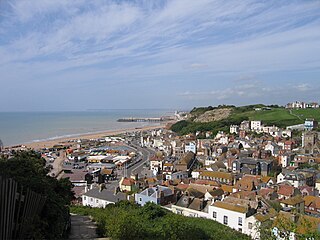
Hastings is a seaside town and borough in East Sussex on the south coast of England, 24 mi (39 km) east to the county town of Lewes and 53 mi (85 km) south east of London. The town gives its name to the Battle of Hastings, which took place 8 mi (13 km) to the north-west at Senlac Hill in 1066. It later became one of the medieval Cinque Ports. In the 19th century, it was a popular seaside resort, as the railway allowed tourists and visitors to reach the town. Today, Hastings is a fishing port with the UK's largest beach-based fishing fleet. It has an estimated population of 92,855 as of 2018.
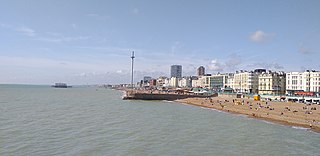
Brighton is a seaside resort and one of the two main areas of the City of Brighton and Hove. Located on the south coast of England, in the county of East Sussex, it is 47 miles (76 km) south of London.

Nicholas Edward Cave is an Australian singer, songwriter, author, screenwriter, composer and occasional actor. Known for his baritone voice and for fronting the rock band Nick Cave and the Bad Seeds, Cave's music is generally characterised by emotional intensity, a wide variety of influences and lyrical obsessions with death, religion, love and violence.
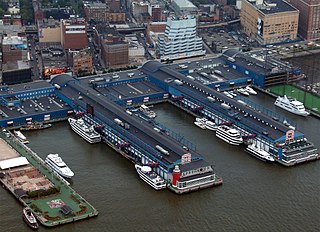
A pier is a raised structure that rises above a body of water and usually juts out from its shore, typically supported by piles or pillars, and provides above-water access to offshore areas. Frequent pier uses include fishing, boat docking and access for both passengers and cargo, and oceanside recreation. Bridges, buildings, and walkways may all be supported by architectural piers. Their open structure allows tides and currents to flow relatively unhindered, whereas the more solid foundations of a quay or the closely spaced piles of a wharf can act as a breakwater, and are consequently more liable to silting. Piers can range in size and complexity from a simple lightweight wooden structure to major structures extended over 1,600 m (5,200 ft). In American English, a pier may be synonymous with a dock.
A seaside resort is a town, village, or hotel that serves as a vacation resort and is located on a coast. Sometimes the concept includes an aspect of official accreditation based on the satisfaction of certain requirements, such as in the German Seebad. Where a beach is the primary focus for tourists, it may be called a beach resort.

Brighton Rock is a novel by Graham Greene, published in 1938 and later adapted for film in 1947 and 2010. The novel is a murder thriller set in 1930s Brighton. The title refers to a confectionery traditionally sold at seaside resorts with the name of the resort embedded in the centre and elongated down the length, which in the novel is used as a metaphor for the personality of Pinkie, which is the same all the way through. There are links between this novel and Greene's earlier novel A Gun for Sale (1936), because Raven's murder of the gang boss Kite, mentioned in A Gun For Sale, allows Pinkie to take over his gang and thus sets the events of Brighton Rock in motion.

Foyle's War is a British detective drama television series set during and shortly after the Second World War, created by Midsomer Murders screenwriter and author Anthony Horowitz and commissioned by ITV after the long-running series Inspector Morse ended in 2000. It began broadcasting on ITV in October 2002. ITV director of programmes Simon Shaps cancelled Foyle's War in 2007, but complaints and public demand prompted Peter Fincham to revive the programme after good ratings for 2008's fifth series. The final episode was broadcast on 18 January 2015, after eight series.

The West Pier is a ruined pier in Brighton, England. It was designed by Eugenius Birch and opened in 1866. It was the first pier to be Grade I listed in England and Wales but has become increasingly derelict since its closure to the public in 1975. As of 2022 only a partial metal framework remains.

New Brighton is a seaside resort in Wallasey, Merseyside, England, at the northeastern tip of the Wirral peninsula. It has sandy beaches which line the Irish Sea and mouth of the Mersey, and the UK's longest promenade.

Eugenius Birch was a 19th-century English seaside architect, civil engineer and noted builder of promenade-piers.

"The Hollow Men" (1925) is a poem by the modernist writer T. S. Eliot. Like much of his work, its themes are overlapping and fragmentary, concerned with post–World War I Europe under the Treaty of Versailles, hopelessness, religious conversion, redemption and, some critics argue, his failing marriage with Vivienne Haigh-Wood Eliot. It was published two years before Eliot converted to Anglicanism.
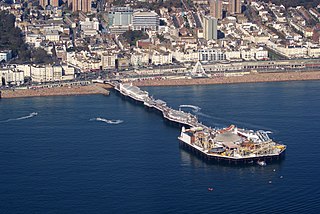
The Brighton Palace Pier, commonly known as Brighton Pier or the Palace Pier, is a Grade II* listed pleasure pier in Brighton, England, located in the city centre opposite the Old Steine. Established in 1899, it was the third pier to be constructed in Brighton after the Royal Suspension Chain Pier and the West Pier, but is now the only one still in operation. It is managed and operated by the Eclectic Bar Group.
Anthony Howell is an English actor, best known for his starring role as Sgt. Paul Milner in the British TV series Foyle's War.

Duncan John Browne was an English singer-songwriter and musician.

"Red Right Hand" is a song by Australian rock band Nick Cave and the Bad Seeds. It was released as a single from their eighth studio album, Let Love In (1994), on 24 October 1994. A condensed version was included in the single, while the longer version was included with the album. The title comes from John Milton's epic poem Paradise Lost, in which it refers to the vengeful hand of God.
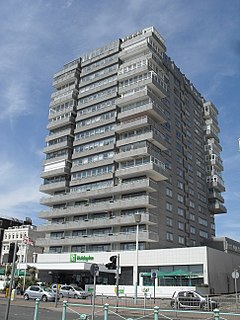
The Bedford Hotel is a hotel on the seafront in Brighton, England which has subsequently been renamed the Holiday Inn Brighton after becoming a part of the Holiday Inn business.

Brighton Rock is a 1948 British gangster film noir directed by John Boulting and starring Richard Attenborough as violent gang leader Pinkie Brown, Carol Marsh as the innocent girl he marries, and Hermione Baddeley as an amateur sleuth investigating a murder he committed.

"I Do Like to Be Beside the Seaside" is a popular British music hall song. It was written in 1907 by John Glover-Kind and made famous by music hall singer Mark Sheridan who first recorded it in 1909. It speaks of the singer's love for the seaside, and his wish to return there for his summer holidays each year. It was composed at a time when the yearly visits of the British working-class to the seaside were booming.

Naomi Foyle is a British-Canadian poet, novelist, essayist, editor, translator and activist. Best known for her five science fiction novels, and her three poetry collections, she is also the author of several poetry pamphlets, two verse dramas and various short stories and essays. A non-Muslim Fellow of the Muslim Institute, Foyle is a contributing editor to Critical Muslim. For her poetry and essays about Ukraine, she was awarded the 2014 Hryhorii Skovoroda Prize.
















